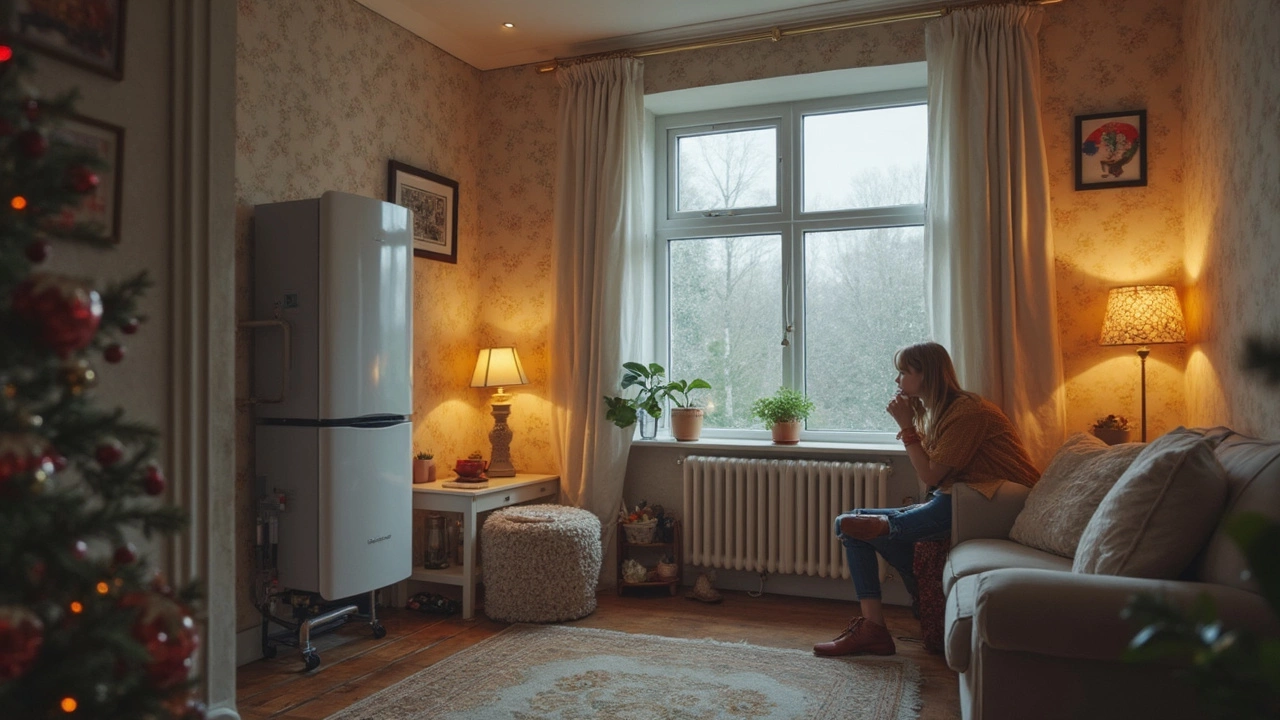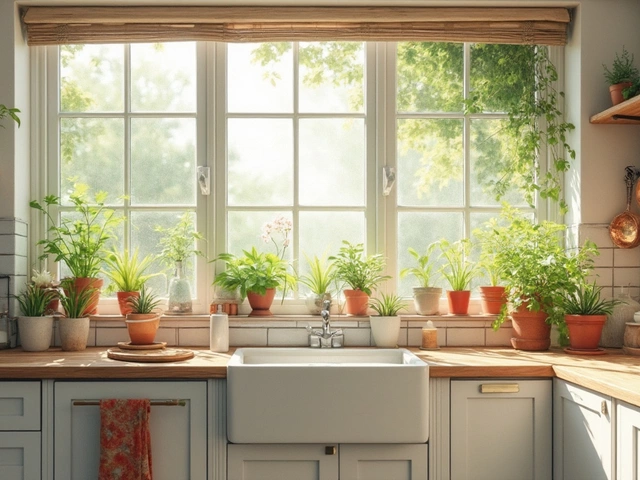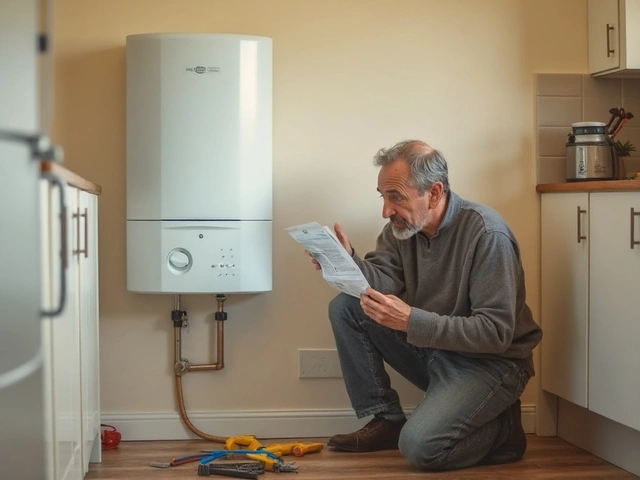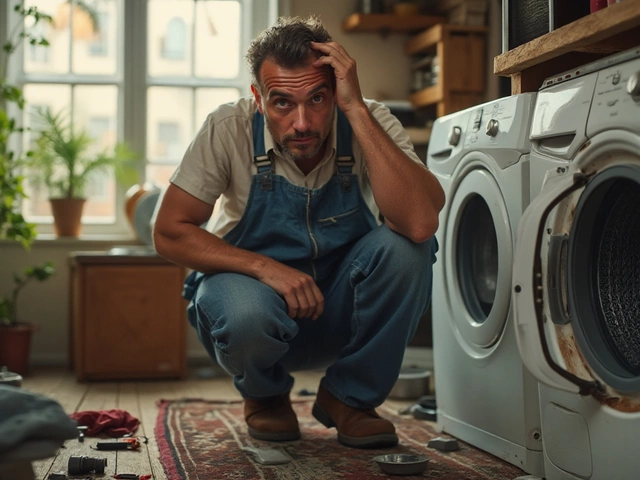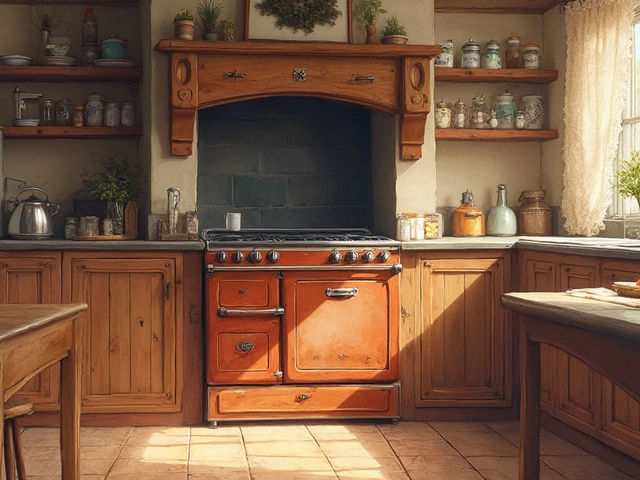Thinking your boiler is acting up and wondering if you should call a plumber? You’re not alone. Lots of people reach for the phone the moment the radiators go cold, but here’s the truth—plumbers and boiler engineers aren’t always the same thing. The difference comes down to how boilers are built, what’s legal, and where safety lines are drawn.
Boilers are a bit tricky. While they use water like your sink or toilet, they’re also fueled by gas or oil and have electrical parts inside. That means there’s more to fixing them than just knowing where the pipes go. Make sure you know who’s allowed to do what before hiring anyone. Saving money isn’t worth risking a leak, a breakdown, or something worse.
Let’s clear up what plumbers actually do, where their skills shine, and when you genuinely need someone with boiler expertise. It’s often about picking the right tool—and the right pro—for the job.
- What Does a Plumber Actually Do?
- How Boilers and Plumbing Connect
- When a Plumber Can Fix Your Boiler
- When You Need a Gas Safe Engineer
- Spotting the Right Tradesperson
- Tips for Boiler Care and Maintenance
What Does a Plumber Actually Do?
So, you hear “plumber” and probably picture someone fixing a leaky tap or unclogging a drain. That’s spot on, but their list of jobs is a lot longer. A plumber is a pro at anything in your home that involves water coming in or going out—sinks, toilets, showers, bathtubs, dishwashers, and washing machines. They install, fix, and maintain water and waste pipes all day long.
Here’s a quick, no-nonsense list of what a plumber usually handles:
- Repairing leaks in pipes or fittings
- Unblocking drains or toilets
- Installing kitchen and bathroom appliances
- Replacing old or broken taps and valves
- Fixing or moving radiators (as part of the heating system)
- Hooking up water to new builds or remodels
The heating system bit is where it gets confusing though. Sure, plumbers can swap out radiators, and sometimes they bleed them or fix simple heating problems, but when gas comes into play—like with most boiler repair jobs—things change quickly. By UK law (and it’s similar in lots of countries), only someone with special training and a license can work on anything involving natural gas or central heating boilers. So, while plumbers might touch bits of the system, they can’t legally open up your gas boiler unless they have extra qualifications.
Here’s a quick snapshot to show where plumbers stand:
| Job Type | Plumber Handles? |
|---|---|
| Fixing dripping taps | Yes |
| Unblocking drains | Yes |
| Central heating pipe leaks | Yes |
| Repairing a gas boiler | Only if Gas Safe registered |
| Electric shower repairs | Maybe, if trained |
Boilers often need both plumbing and heating knowledge, but not every plumber is trained or allowed to safely touch your boiler. That’s why it’s worth checking qualifications before you let anyone loose on your system.
How Boilers and Plumbing Connect
Here’s where people get mixed up: boilers and the plumbing in your home work together, but not in exactly the same way as your normal kitchen tap or toilet. Your boiler sits at the center of your heating system. It’s basically a water heater on steroids, pumping hot water through pipes to your radiators and taps. In simple terms, it’s tied into your home’s main network of water pipes, but it’s also got extra parts—like valves, pumps, and controls—that most regular plumbing doesn’t have.
Let’s break it down. When you turn up the thermostat, the boiler kicks in and heats water. This hot water flows through pipes to the radiators, or to your taps if you’re running a hot shower. Those pipes are the same kind a plumber deals with every day. If there’s a leak, low pressure, or a problem with the pipework or the radiators, a plumber can often fix it.
But unlike your kitchen tap, most boilers are powered by gas or oil, and that means there’s a different level of risk. Gas lines and combustion inside the boiler are dangerous to mess with without proper training. That’s why in the UK, for example, you legally need a Gas Safe registered engineer for anything involving the gas side of things.
| Component | Handled by Plumber? | Specialist Needed? |
|---|---|---|
| Pipework Leaks | Yes | No |
| Radiator Issues | Yes | No |
| Gas Connections | No | Yes (Gas Engineer) |
| Boiler Internals | No | Yes (Boiler Specialist) |
| Pressure Problems | Sometimes | Sometimes |
So, while the boiler and your plumbing are totally interconnected, fixing one doesn’t always mean a regular plumber is your go-to. It matters what’s actually gone wrong. Next time you spot water under the boiler or the radiators won’t heat up, think about whether it’s a straight-up plumbing job—or something that needs a specialist.
When a Plumber Can Fix Your Boiler
So, when can you actually bring in a plumber for a boiler problem? It depends on what’s wrong. Not all boiler issues need a certified boiler engineer. Some repairs and maintenance are right in a regular plumber’s wheelhouse, especially when they don’t mess with the gas or electrical systems.
Here’s where a plumber is usually the right person to call:
- Water leaks: If water is pouring or dripping out from your boiler or the pipes connected to it, a plumber can trace the source. They’re trained to fix pipework, valves, and seals—think leaky joints or busted pressure relief valves.
- Radiator problems: Cold spots, banging noises, and uneven heat often come down to trapped air or sludge in the system. Plumbers can bleed radiators, flush out the system, and balance everything so heat spreads evenly.
- Low boiler pressure: Sometimes the problem is as simple as topping up the system pressure. Plumbers can run checks, find slow leaks, and show you how to do basic pressure adjustments safely.
- Minor upgrades: Swapping old thermostatic valves, fitting new filling loops, or replacing worn washers on components outside the sealed system are standard plumber jobs.
Here’s a quick look at which common jobs can be tackled by a plumber and which should go to a gas engineer:
| Boiler Issue | Plumber | Gas Engineer |
|---|---|---|
| Leaking pipes | Yes | No |
| Bleeding radiators | Yes | No |
| Boiler won’t ignite | No | Yes |
| Gas smells | No | Yes |
| Boiler service | No | Yes |
Bottom line: If your problem is with water flow, radiators, or anything outside the actual burner or electrical stuff in the boiler, a plumber is the way to go. But as soon as you notice anything related to gas, the main boiler unit, or power issues, don’t risk it—call a Gas Safe engineer instead.
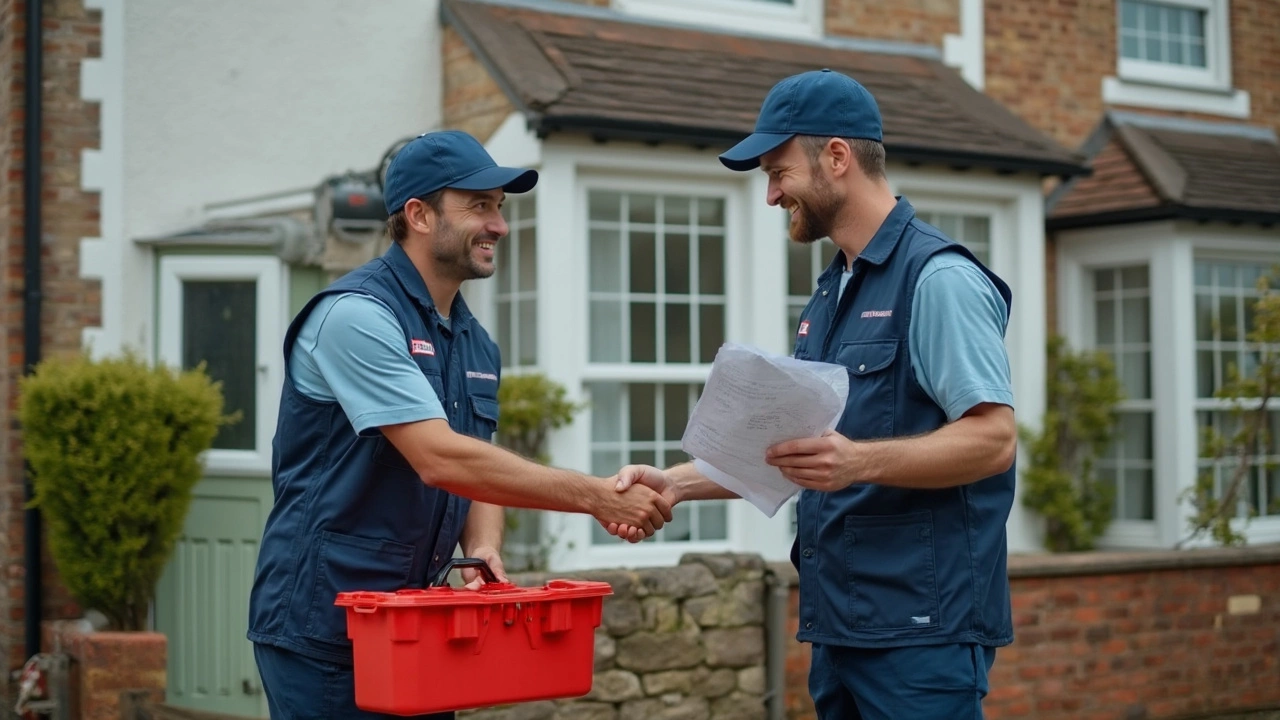
When You Need a Gas Safe Engineer
If your boiler repair involves anything to do with gas or the boiler's internal parts, don’t let any old plumber touch it. Legally, only a Gas Safe engineer is allowed to work on gas boilers in the UK. This isn’t just a random rule – it's about keeping your home safe from leaks, carbon monoxide, and possible explosions.
Here’s when you absolutely need a Gas Safe registered pro:
- Your boiler isn’t firing up at all.
- You suspect a gas leak or smell gas near your heating system.
- The pilot light keeps going out, or is an odd color (it should be blue, not yellow or orange).
- There’s water leaking from inside the boiler casing—not just from outside pipework.
- You want to install, replace, or move a gas boiler or any gas appliances.
Don’t gamble on this—you could void your warranty or home insurance, and more importantly, put your health at risk. If a tradesperson can’t show you their Gas Safe card, send them packing.
Just to underline how serious this is, check out these common gas boiler dangers according to the Gas Safe Register:
| Hazard | Potential Risk |
|---|---|
| Faulty Installation | Gas leaks, fire, explosion |
| Poor Repair Work | Carbon monoxide poisoning |
| DIY Gas Work | Legal penalties, insurance issues |
Bottom line? Call a Gas Safe engineer for anything gas-related. Fixing a leaky radiator? A plumber’s your guy. But for the heartbeat of your heating system, don’t mess around—call in the specialist.
Spotting the Right Tradesperson
So how do you make sure you’re calling the right person for that boiler repair? It starts with knowing the difference between a regular plumber and a qualified boiler engineer—sometimes called a heating engineer or a Gas Safe engineer. Not everyone with a wrench is cleared to mess with gas appliances. That’s not just old-school thinking; that’s the law in the UK and most places with gas heating.
The golden rule: if your job involves gas—like fixing a boiler breakdown, checking for leaks, or installing a new heating system—you need someone who’s on the Gas Safe Register (or the equivalent in your country, like RGI in Ireland). Plumbers are pros at all things pipes and water, but not all are qualified to work on gas boilers. Some plumbers get qualified, some don’t. So always check before you book anyone.
- Ask to see their Gas Safe ID card. A legit engineer will show it straight away—no awkwardness.
- Look up their name or company on the Gas Safe Register website. It takes two minutes on your phone and cuts out the guesswork.
- Check reviews, not just star ratings. Real stories from neighbours can clue you in about reliability and whether they actually fixed the problem.
- If you’re dealing with oil boilers, look for OFTEC registration instead—a different safety standard, but just as important.
According to a recent UK government survey, over 240,000 gas work jobs each year are done by people who aren’t legally registered. That’s a lot of risky shortcuts. Get the right tradesperson, and you’re more likely to have a warm, safe home with zero drama.
And here’s another quick tip: don’t be shy about asking what experience they have with your exact boiler make and model. The best engineers (and trustworthy plumbers) will have fixed dozens just like yours and won’t mind sharing some quick boiler care tips while they’re there.
Tips for Boiler Care and Maintenance
If you want your boiler to last and keep those heating bills low, you really need to look after it. Ignoring maintenance can turn a small issue into a big, messy, and expensive problem. Let’s break down what actually works.
- Annual Service: Get your boiler checked every year by a registered Gas Safe engineer. Skipping this can mean you miss early signs of trouble, and some warranties don't cover repairs if you haven't kept up with services.
- Bleed Your Radiators: If they’re not heating up properly or feel cold at the top, air might be trapped inside. Bleeding them helps your heating system run smoother and more efficiently.
- Keep an Eye on Boiler Pressure: Most boilers run best between 1 and 2 bars of pressure. Too high or low? Your heating won’t work like it should. You’ll usually find the gauge on the front—if it drops often, there’s likely a leak.
- Watch for Leaks: Never ignore even tiny spots of water under your boiler. Small leaks destroy internal parts over time and could mean bigger issues are coming.
- Insulate Pipes: If you live somewhere chilly, lagging your pipes can stop them freezing in winter. Frozen pipes are a nightmare and can totally shut down your heating system.
- Test Your Heating Early: Don’t wait for that first big freeze to find out your boiler’s dead. Fire up the boiler at least once a month, even in summer, just to keep everything ticking over.
These little steps can help avoid calling out a plumber or heating engineer for stuff you could have sorted months back.
| Maintenance Task | Recommended Frequency |
|---|---|
| Annual service | Once a year |
| Bleed radiators | At least once a year, or when heating is uneven |
| Pressure check | Monthly |
| Check for leaks | Monthly |
| Pipe lagging check | Before freezing weather |
Staying on top of these simple things can help your boiler avoid breakdowns, keep your boiler repair costs low, and make sure you’re warm no matter what the weather does.
